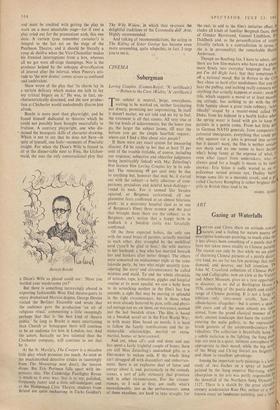CINEMA
Subergman
Loving Couples. (Cameo-Royal; 'X'. certificate.) —Rotten to the Core. (Rialto; 'A' certificate.)
1-1E subject is neutral, beige, amorphous, I waiting to be worked on, neither fascinating nor dreary, promising nor unpromising. In itself it doesn't matter, we are told and we try to feel, the treatment is all that counts. All very true at the top levels of achievements; but the lower you go, the larger the subject looms, till near the bottom you get the simple heartfelt request: where can I find a film about nice people?
If there were any exact system for measuring disaster, I'd be ready to bet that at least 51 per cent of the trouble (trauble, of course, including our response; subjective and objective judgments being inextricably linked) with Mai Zetterling's first feature film Loving Couples lay in its sub- ject. The remaining 49 per cent may be due to anything but, however that may be, it started out with the subject—a hefty albatross of com- parisons, prejudices and doleful head-shakings- -round its neck. For it seemed like Sweden squared, or Bergman caricatured, all our gloomiest fears confirmed at an almost hilarious pitch: in a maternity hospital (just as in one of Bergman's films) three women and the past that brought them there are the subject; as in Bergman, one's notion that a happy birth in wedlock is a Swedish rarity was forcefully confirmed.
Of the three expected babies, the only one with•the usual brace of parents, actually married to each other, dies strangled by the umbilical cord (`you'll be glad to hear,' the wife mutters to her husband; a hag who has married beneath her and hankers after better things). The others were conceived on midsummer night at the same lakeside party, by two who might quaintly (con- sidering the story and circumstances) be called mistress and maid. To end the whole chronicle of screams, rape, lesbianism, giggles and hospital routine at its most squalid, we saw a baby born to its screeching mother in the film's last few seconds, a sight that may be moving or splendid in the right circumstances, but in these, when we were already battered by pain, yells and physi- cal outrage (on us, on them, on everyone), seemed just the last Swedish straw. The film is based on a Swedish novel set in the First World War; as with many films based on novels, it is hard to follow the family ramifications and the in- numerable relationships, marital or extra- marital, homo- or heterosexual.
And yet, when all's said and done and one has spent a fairly frightful couple of hours, there are still Miss Zetterling's undoubted gifts as a film-maker to reckon with. If the whole thing isn't shrugged off with discomfort and embarrass- ment, there is an explosive deal of force and energy about it, and, particularly in the comedy scenes, a sort of jolly virtuosity that promises well in other circumstances. For the circum- stances, as I said at first, are really what's unswallowable; just as the performances, some of them excellent, are hard to take straight, for the cast, to add to the film's imitative effect, it eludes all kinds of familiar Bergmah faces, those of Gunnar Bjorstrand, Gunnel Lindblom, true Dahlbeck and, as the personification of intense frivolity (which is a contradiction in terms. a` she is in personality), the remarkable Hartle' Andersson.
Though no Boulting fan, I have to admit, since there are few film-makers who have put a phrase more firmly into everyday language than thel put I'm All Right Jack, that they sometimes III! off a national mood. But in Rotten to the CO they chase so hard after modishness that you 0(1 hear the puffing, and nothing really connects vil0 anything that actually happens or exists: even the title, which suggests a moral or at least moat!' ing attitude, has nothing to do with the On little fantasy about a great train robbery, `sciell' tifically' staged by a master-mind called The Duke, from his hideout in a health hydro where the spring water is laced with gin to keep till patients in a gentle coma. From hot little deb" to German NATO generals, from computers to coloured immigrants, everything that could Pos sibly squeeze out a joke is pressed into service' but it doesn't work, the film is neither amiable nor sharp and no one seems to have decided who's being funny at the expense of what, ell even what (apart from undertakers, who are always good for a laugh) is meant to be fora anyway. Eric Sykes is sadly wasted as an ell. policeman turned private eye, Dudley Suite!, brings some life to a moronic crook, and a Ber called Charlotte Rampling is rather brighter than girls in British films tend to be.














































 Previous page
Previous page